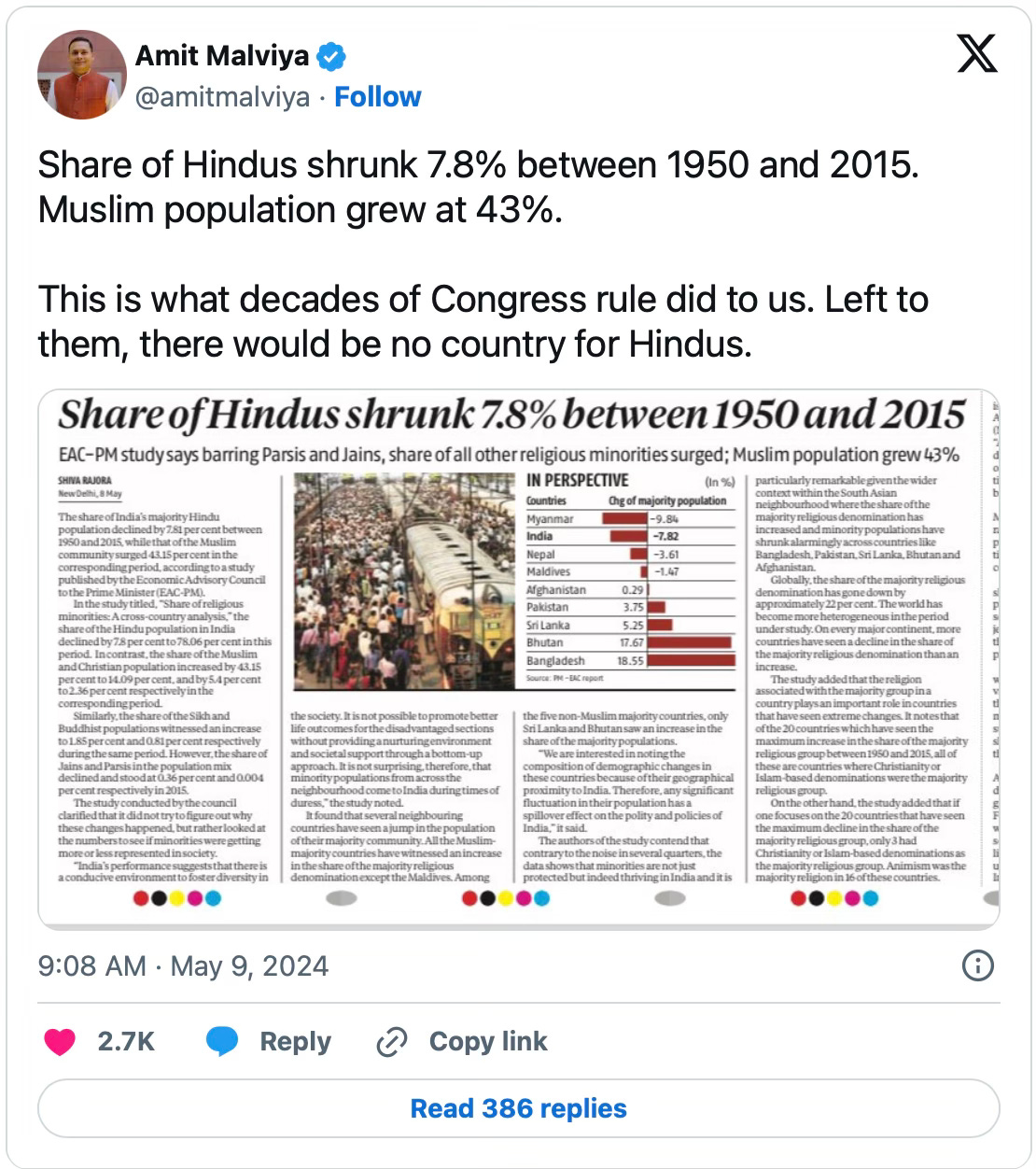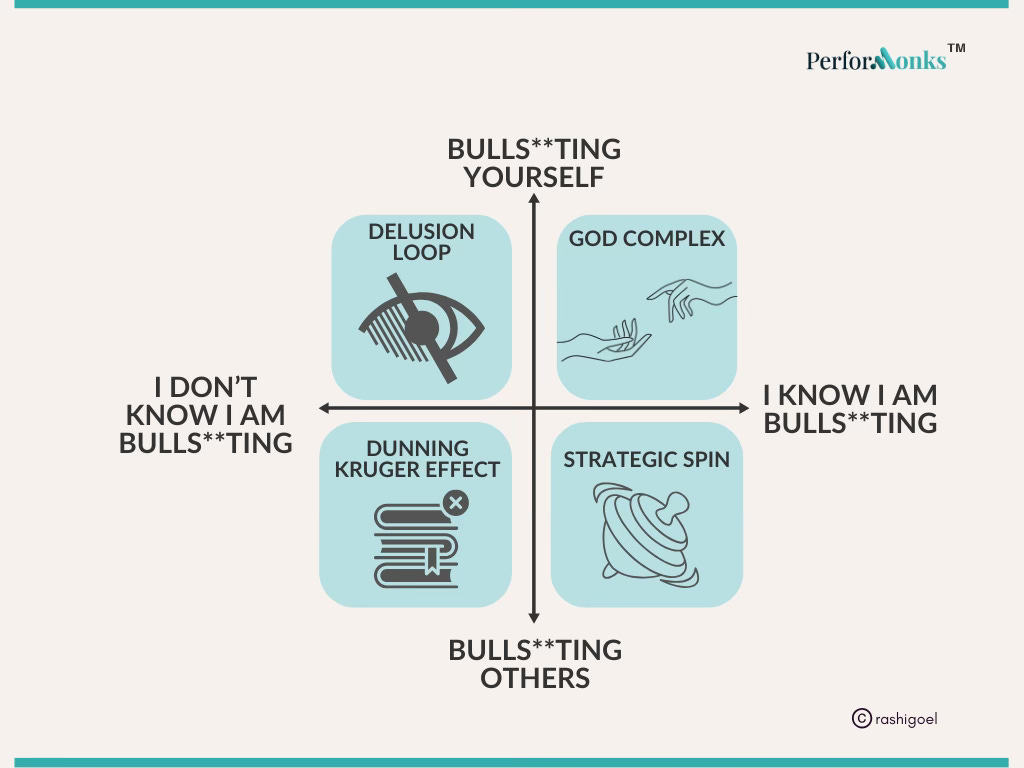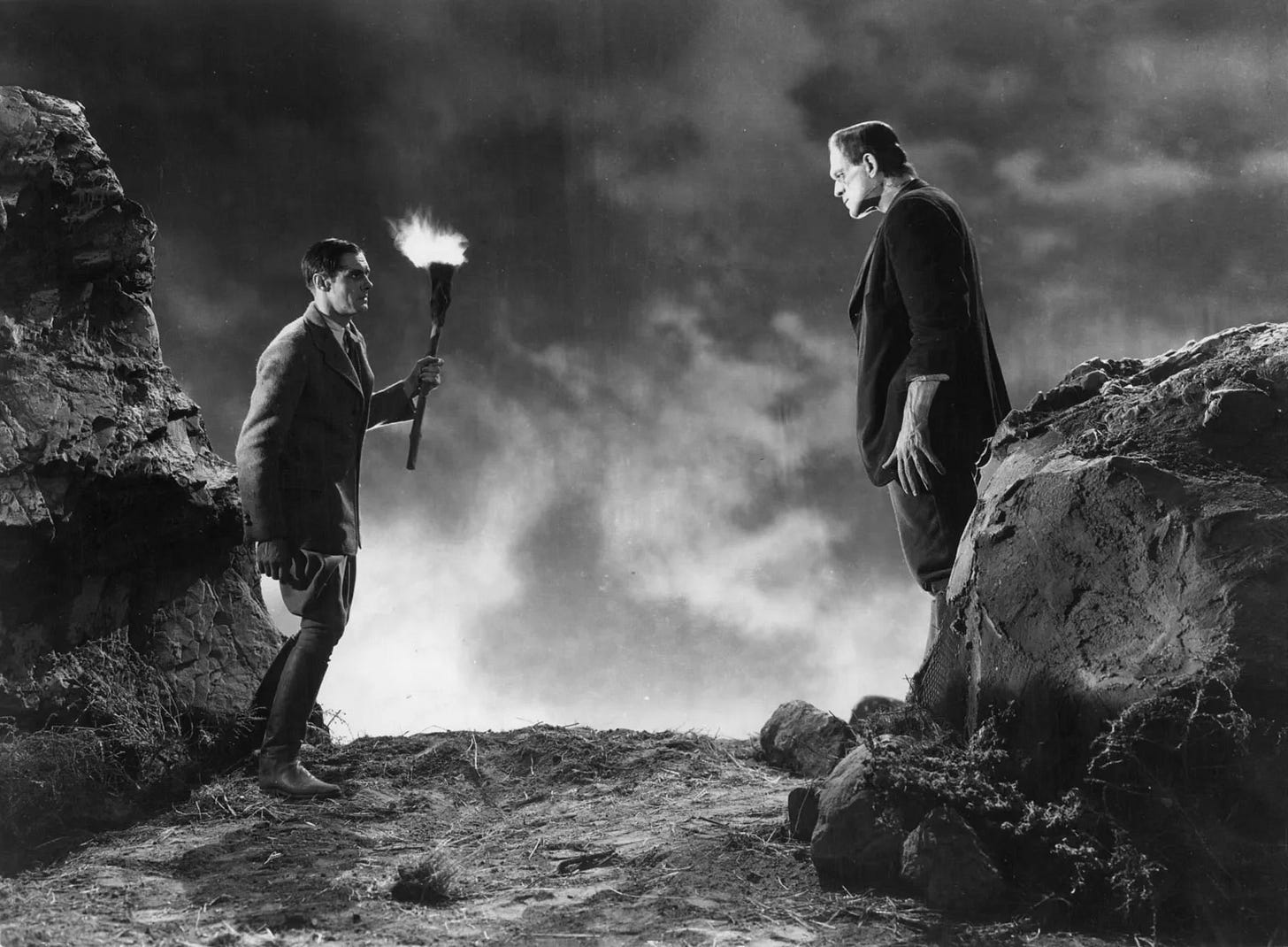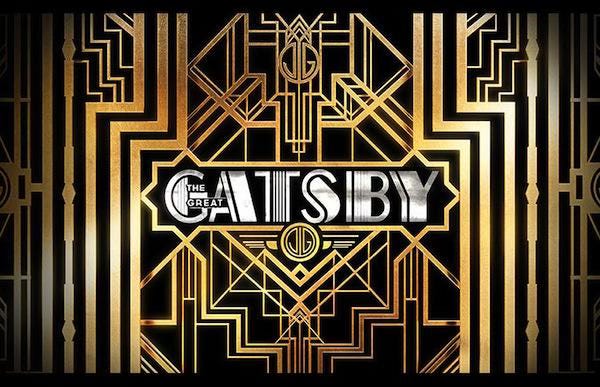It’s getting colder by the day.
All we can do is stay inside and blame our wine-coffee-cake overindulgence on the weather, pollution and Christmas.
Blaming our lack of willpower on external circumstances is bulls**t. Bulls**t is also the topic for today’s article.
- What is bullsh**t?
- Bulls**t is not an outright lie.
- Bulls**t has become unconscious.
- Social media algorithms actively promote bulls**t.
- Bulls**t has many unseen consequences
- There are four types of bulls**t
- Delusion Loop
- God Complex
- Dunning Kruger Effect
- Strategic Spin
“It is impossible for someone to lie unless he thinks he knows the truth. Producing bullshit requires no such conviction.”
― Harry G. Frankfurt, On Bullshit
Bulls**t is all those things we say to get our way, win an argument, drive our hidden agendas or get ourselves out of tricky situations.
Bulls**t is not an outright lie.
It is a complete and absolute disregard for the truth.
That’s why experts worry about bulls***ters more than they worry about liars. They say that at least a liar knows the truth and works hard to manufacture a lie to mask it.
A bulls***ter does not even care to know the truth.
Since bulls**t is not an outright lie, bulls***ters enjoy plausible deniability and continue to spread their bulls**t far and wide.
When Trump says that immigrants eat pets, he is bulls*****ng. [source]
—Trump has prefected the art of bulls***ting at scale
Bulls**t is the hundreds and thousands of white lies, hidden agendas, false assurances and aggressions masked in corporate rituals, that seem harmless at first glance but aren’t.
We were presenting an annual plan to our team. A guy with an agenda (he was junior to me, but had been coddled by the boss), went out of his way to loudly disagree with anything I said. I later learnt that he had also texted his team even before the meeting, commanding them to disagree with everything I said (and they did). His objective was to discredit me by going out of the way to disregard the truth even if the truth benefited the company.
—My most recent memory of a bulls**t moment at work.
Bulls**t has become unconscious.
We have been socialized to believe that bulls**t is the way the world operates. That’s why it thrives in plain sight.
Even so, a part of our brain can sense it.
You know those times when you felt something was not quite right yet you could not put your finger on it?
You had stepped into a stinking pile of bulls**t.
Social media algorithms actively promote bulls**t.
Whether we realize it or not, we are all swimming in bulls**t because bulls**t thrives and multiplies on social media.
The equation is simple. Social media survives on advertising dollars —> advertisers pay for reach —> more the reach, more the masses —> and masses engage more with ‘meh’ or incendiary content that confirms their worst (but false beliefs).
Here is an example-

Bulls**t has many unseen consequences.
Trust does not survive within the blast radius of a world-class bulls***ter. Unfortunately, trust dies a slow and painful death because bulls**t can go unchecked for decades and even lifetimes.
I attempt to dive deeper into four types of bulls**t and bring them alive for you.
Let’s go.
There are four types of bulls**t
When we intersect “I know I am bulls******g” and “I don’t know I am bulls******g” with “bulls******g myself” and “bulls******g others,” we get four types.

1. Delusion Loop
Deeply ingrained false beliefs – both good and bad – about ourselves.

A minor nobleman named Alonso Quixano thirsts for adventure and believes his greatest achievements are yet to come. He christens himself Don Quixote, and recruits a peasant Sancho Panza to be his squire, even promising him ownership of an island when they return. He is so delusional about his grandiosity that he attacks a row of windmills, believing them to be gigantic knights.
—Don Quixote, to me, personifies the Delusion Loop perfectly
Delusion loops are far more insidious than blind spots.
The delusion loop is addictive and can become a central anchor of our identity. So much so that we fail to process anything that pricks our delusion bubble. That’s why, our delusion self-propagates into a loop.
Not just people, even companies sink into delusion loops. When Kodak believed its dominance in film photography would shield it from digital disruption, it was drinking its delusion-flavored cool-aid.
When we feed delusion loops, we promote mediocrity.
Almost always, I have seen that delusion loops lead to mediocre lives. A person who believes she was born unlucky will spend her lifetime mistrusting lucky breaks and will self-sabotage.
We promote mediocrity in our kids when we hand out gold medals for just participating in that annual sports day.
The most common delusion loop I have seen is at work, when team members demand promotions despite a meh performance.
2. God complex
Hubris.

Dr. Victor Frankenstein fancies himself to have God-like qualities. He stitches together parts of different cadavers to create a living, thinking creature. The creature turns into a monster and Dr. Victor spends the rest of his life trying to destroy it.
—Dr. Victor Frankenstien personifies God Complex.
The difference between God Complex and Delusion Loop is intelligence and the perception of power. Both bulls**t themselves. But those with a God-complex are such geniuses and hold so much power that they genuinely believe their bulls**t.
As Scott Galloway says, our idolatry of innovators feeds their God Complex.
Innovators start as geniuses and also create substantial market value. But over time, lots of power, influence and success act like fertilizer to their already oversized God Complex.
There are examples everywhere, of Dr.Victors creating their Frankensteins – WeWork and Adam Neumann. Uber and Travis Kalanick. Byju Raveendran and Byjus. Vijay Mallaya and Kingfisher. Elon Musk and Twitter…
3. Dunning Kruger Effect
When the underqualified believe they know more than they do.

Michael is an incompetent manager and doesn’t know it. His life revolves around his workplace and he simply cannot see that he brings neither competence nor empathy to his co-workers. He overestimates his importance, while his co-workers tolerate his buffoonery.
— Michael Scott personifies the Dunning-Kruger effect beautifully
The Dunning–Kruger effect is a cognitive bias in which people with limited competence overestimate their abilities.
We see this type of bulls**t all around us.
Daily, on LinkedIn – there is a stench of overconfidence in ChatGPT-generated writing that just isn’t there in a human-generated article. 🙂
Frequently in business, when founders over estimate their product and think that just because they have launched something, it will sell. Remember Quibi? It launched in Apr’2020, and folded by Dec’2020. Why? Because its founders did not realise that their entire business model and programming was crappy – original, paid, 10-minute content vs. free, 30-second UGC, powered by Tik Tok’s addictive algorithm.
And often in the form of memes or oversimplified urban legends, like the 10,000 hour rule of mastery, which misses the most important point, that simply practising anything over 10,000 hours does not lead to mastery. Talent and quality of practice do.
Businesses have been reduced to ‘Valuations’.
Marketing has been reduced to ‘Communications’.
Communications has been reduced to ‘Performance Marketing’.
Consumer Insight has been reduced to ‘Likes and Follows’.
Deep work has been replaced by ‘AGI’.
Learning and growth have been replaced by ‘designations’.—A list of my pet peeves about the Dunning-Kruger effect in business and marketing
4. Strategic Spin
Intentional and calculated bulls**t that projects a pimped up reality.

Gatsby is nouveau-riche and is known for legendary parties at his palatial mansion. As it turns out, he has earned his money through bootlegging and has been putting up a show all this time to win the love of the beautiful and rich Daisy Buchanan. Daisy on the other hand, is a shallow, appearance obsessed socialite.
— The gap between appearance and reality is best described in The Great Gatsby
Strategic spin has become ‘good business’
Marketers do this in advertising, politicians do this when they are campaigning and founders do this when they are fund raising.
Why is that?
Is it that stakeholders find ‘normal’ strategies boring? Or maybe we want results so fast that home work or ‘trust but verify’ feels like a waste of time? Whatever the reason might be, there are many examples of strategic spins gone wrong – Theranos and Elizabeth Holmes. Enron and Arthur Anderson. Mckinsey and the Opioid Crisis. The non-existent Weapons of Mass Destruction in Iraq. Or Boris Johnson’s Brexit claimthat U.K. pays £350 million per week to the EU.
Is there a way we can start calling out bulls**t as it happens? I can’t think of any. I think it’s become endemic to the whole world.
If you’ve reached here, thanks for reading my rant. And I’ll see you next week with this year’s last newsletter.
